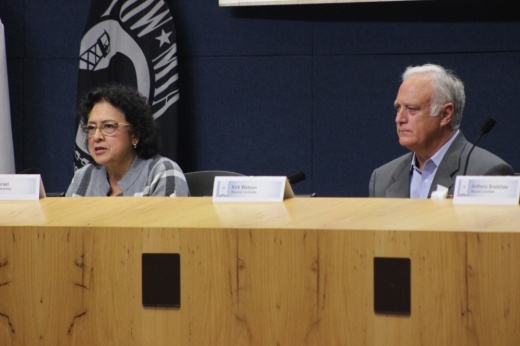Austin mayoral candidates Celia Israel and Kirk Watson are headed for a runoff election.
In the November general election, Israel won 121,862 votes, or 39.99%, and Watson had 34.95% with 106,508 total votes, based on final results from Hays, Travis and Williamson counties. With neither reaching the 50% threshold needed for an outright win, the pair will face off in the runoff Dec. 13.
With 18.44% of the vote, Jennifer Virden finished in third place and fell short of the runoff. Candidates Phil Campero Brual, Anthony Bradshaw and Gary S. Spellman all won less than 3% of the vote.
Israel was joined by supporters and local politicians on election night for a rainy campaign party at Lustre Pearl East after early results showed her leading in the race. Israel said she was excited and proud at the outcome and that she plans to change "absolutely nothing" about her campaign over the next five weeks.
"We have the bold and the visionary policies that will resonate with this electorate one more time. And I wish we could have won outright, but we will take our winning message that has resonated tonight and take it back out to the electorate and bring this election home," Israel told Community Impact.
At his downtown watch party at Speakeasy, Watson said he was not surprised to see the contest head to a one-on-one matchup and that he welcomes the opportunity to continue connecting with city voters and eventually hit the ground running at City Hall.
“People are excited; people are happy; and I feel a sense of enthusiasm and kind of an electricity about, ‘OK, we’ve got a five-week sprint; there’s a lot of focus; let’s get this done,'" Watson said.
Posted 7:40 p.m. Nov. 8
Austin appears headed for a mayoral runoff election based on early voting results released shortly after 7 p.m. Nov. 8.
Early returns show state Rep. Celia Israel in the lead with 91,568 votes across Hays, Travis and Williamson counties, 41% of the early voting total. Kirk Watson, the former Austin mayor and state senator, garnered 81,202—36.36%—while real estate broker Jennifer Virden received 38,644 votes for 17.3% of the early total across the two counties.
With between 3,383 and 4,397 votes, candidates Phil Campero Brual, Anthony Bradshaw and Gary S. Spellman each earned less than 2% of the early vote.
Austinites across the three counties cast 223,315 early votes in the mayoral contest this year compared to 239,486 in 2018. Election results will continue to be updated throughout the night, and results are unofficial until canvassed. Visit communityimpact.com/voter-guide to see results from all local elections in your community.
With their backgrounds in politics and significant fundraising activity throughout the year, Israel, Watson and Virden appeared to be the three front-runners in the mayor's race leading up to Election Day. Watson and Israel, both established Democrats, could end up splitting much of the liberal vote in the city while Virden—who pushed against Austin's existing, left-leaning council in this year's campaign after nearly winning the District 10 seat in 2020 running as a conservative—will likely draw more Republican support.
The breakdown of Election Day votes among the favorites will determine whether a clear winner is selected this month. A contender must earn at least half of Austin's vote to earn a win on election night, otherwise, the top two vote-getters will head to a runoff election Dec. 13. Austin's next mayor will be sworn in Jan. 6 and serve for a shortened two-year term after voters decided last year to line up the city's mayoral contests with U.S. presidential elections. They will be eligible for re-election to a standard four-year term in 2024.
Israel's campaign also highlighted her own service under Gov. Ann Richards and through her multiple terms in the Legislature, with an appeal to working-class and younger voters to disrupt Austin's "status quo." Israel's top issue this year has been Austin's cost of living, alongside topics, such as mobility, public safety and abortion rights.
Watson's campaign focused on his experience both at City Hall and in the Texas Legislature as well as his role as dean at the University of Houston's Hobby School of Public Affairs. Several of Watson's stated priorities include housing and affordability, transportation in the city, public safety, and homelessness, with the goals of building consensus and solving top civic problems in office.
As opposed to the two seasoned politicians, Virden pointed to her decades of experience in the business world as a key reason she is best positioned to manage city government. Virden said her platform is based on her "common-sense" solutions to affordability, public safety, homelessness response and city budgeting.
The winner will take over the mayor's seat from Steve Adler, who led the first 10-1 council in Austin after the city adopted new geographic districts in place of its former at-large system in 2014. Adler handily won re-election in 2018 and in his second term led city leaders through consequential votes on issues, including homelessness, police funding and land use in addition to managing Austin's response to Winter Storm Uri and the COVID-19 pandemic.
Several of those issues are likely to remain in focus with a new mayor and several new council members in place next year. While the mayor is not the top power in the city—administration and executive responsibilities fall to the city manager—the ceremonial government leader chairs City Council meetings and will have the ability to direct policy discussions over the course of their term.





